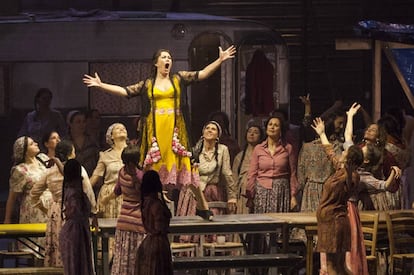A feminist twist on ¡®Carmen¡¯ scandalizes Italy
Florence theater stages an adaptation of Bizet¡¯s opera that takes a stand on violence against women


To what extent can art be rewritten to address current issues? Florence¡¯s Maggio Musicale theater decided to see for itself by putting on Leo Muscato¡¯s adaptation of Bizet¡¯s Carmen in which, instead of being stabbed to death, the heroine snatches the gun from her tormentor Don Jos¨¦ and kills him.
The idea, according to the theater¡¯s management, was to address the rampant violence against women, which in Italy results in one murder every three days ¨C a phenomenon known as ¡®femicide¡¯. But in a country where opera is akin to religion, manipulating the end of this classic has prompted a tsunami of controversy and outrage.
Theater should be about condemnation, culture should be reinterpreted to address the present Dario Nardella
Last century, all kinds of experiments were carried out in a bid to help the opera survive. Directors such as Peter Sellars transported classic operas to the modern world at the start of the 1980s, starting with Mozart¡¯s Don Giovanni, whose main character injected heroin on stage at the Monadnock Music Festival in Manchester in 1980.
Since then, adaptations of the classics has become mainstream fodder for modern theater. Muscato has set his Carmen in a Romani gypsy camp in 1980s Italy, with Don Jos¨¦ cast as a riot policeman. But it was the ending, not this, that earned Muscato boos from the audience, threats on social media and even the incomprehension of good friends.
His critics point to this age of political correctness, when violence against women has been given added resonance by the exposure of certain powerful figures in the film industry. Yet this correctness can sometimes crudely disguise the uncomfortable and violent events that take place in great works of art.
One woman is murdered every three days in Italy
The revision of 24 of Shakespeare¡¯s plays by Thomas Bowdler in 1807 has been hauled up as an example. Among other changes, this meant that Hamlet¡¯s Ophelia died accidentally instead of committing suicide. The critics also point to the incident when a petition bearing 8,700 signatures tried to persuade the MET to take down Th¨¦r¨¨se Dreaming, a Balthus painting of a 13-year-old girl with her leg raised to reveal her underwear.
The New York gallery refused to bow to the pressure, and the Italian press expressed withering concern that the Florence theater had not acted similarly. ¡°Perhaps we should make a version of Moby Dick where the whale doesn¡¯t die and is simply put to sleep?¡± came a taunt from La Repubblica. In France, home to Bizet and M¨¦rim¨¦e, the ending has also caused a stir.
We no longer have the cultural and intellectual freedom to be prepared to be surprised Leo Muscato
But Muscato does have supporters, among them the mayor of Florence, Dario Nardella ¨C who is also a violinist, president of the theater in question and an avid opera fan. ¡°I appreciate his choice because he did it with a particular goal,¡± Nardella told EL PA?S. ¡°And that is to reflect a very serious issue in Italy, namely violence against women. There has been heated debate and much criticism, some of which I don¡¯t understand. It¡¯s not an ideological issue about changing an opera or its denouement. Theater should be about condemnation, culture should be reinterpreted to address the present. The great culture of the past is also valid. It doesn¡¯t mean changing the past. I¡¯m not a fool who is considering rewriting art. The message conveyed by the choice of this director is social and cultural ¨C to call attention to an issue as serious as ¡®femicide¡¯.¡±
Muscato, on the other hand, appears worn out by the controversy. ¡°It has caused an excessive, exaggerated fuss,¡± he said in a telephone conversation. The six performances, seating an audience of 1,600 each night, are now sold out and the theater would like to extend its run. But the public¡¯s derision, which has turned on the failure of the gun to go off at the premiere, has become unbearable.
¡°The only reason I agree to bring a classic to the stage is to trigger debate and stir emotions,¡± adds Muscato, who refuses to be labeled as politically correct. ¡°I was not seeking to shock. I never mentioned ¡®femicide¡¯ but I¡¯m glad it¡¯s been seen that way. It worries me that we no longer have the cultural and intellectual freedom to be prepared to be surprised. They can¡¯t burn me at the stake without seeing the whole opera.¡±
Ironically, those who would like to do so are out of luck, as there are no tickets left.
English version by Heather Galloway.
Tu suscripci¨®n se est¨¢ usando en otro dispositivo
?Quieres a?adir otro usuario a tu suscripci¨®n?
Si contin¨²as leyendo en este dispositivo, no se podr¨¢ leer en el otro.
FlechaTu suscripci¨®n se est¨¢ usando en otro dispositivo y solo puedes acceder a EL PA?S desde un dispositivo a la vez.
Si quieres compartir tu cuenta, cambia tu suscripci¨®n a la modalidad Premium, as¨ª podr¨¢s a?adir otro usuario. Cada uno acceder¨¢ con su propia cuenta de email, lo que os permitir¨¢ personalizar vuestra experiencia en EL PA?S.
En el caso de no saber qui¨¦n est¨¢ usando tu cuenta, te recomendamos cambiar tu contrase?a aqu¨ª.
Si decides continuar compartiendo tu cuenta, este mensaje se mostrar¨¢ en tu dispositivo y en el de la otra persona que est¨¢ usando tu cuenta de forma indefinida, afectando a tu experiencia de lectura. Puedes consultar aqu¨ª los t¨¦rminos y condiciones de la suscripci¨®n digital.










































